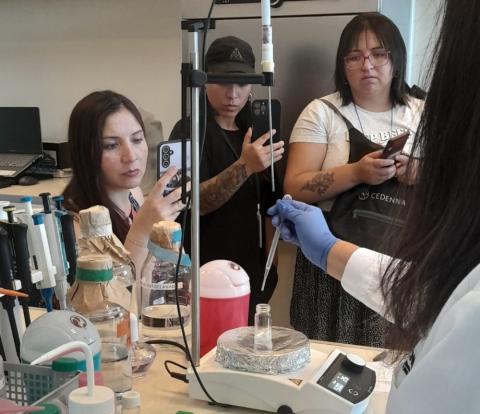
A unique and replicable scientific experience in the classroom: High school teachers from different regions of the country will participate in the development of albumin nanoparticles using egg white during the ProNano 2025 workshop, developed by the Center for Nanoscience and Nanotechnology (CEDENNA), based at the University of Santiago de Chile (USACH).
The activity, completely free of charge, is part of an intensive training day in nanoscience and nanotechnology, aimed at biology, chemistry and physics teachers, and seeks to provide concrete and updated tools to address content that is part of the school curriculum, especially in third and fourth grade..
“This is an activity that teachers can replicate directly in their classrooms, using everyday, accessible materials. Through a simple process, they will transform an egg white into a tangible example of cutting-edge science,” explained Dr. Patricia Díaz, the CEDENNA researcher in charge of the practical experience.
Dr. Díaz explained that ovalbumin nanoparticles—the protein predominantly present in egg white—are similar to the human albumin nanoparticles currently being produced and constitute an advanced drug delivery system, widely researched in the field of nanomedicine. “These particles are biodegradable and safe, and are currently used in cancer treatments for controlled drug release and in bone marrow scintigraphy, lymphoscintigraphy, and sentinel node localization studies in patients with malignant melanoma and breast cancer. Because ovalbumin nanoparticles are edible, they can be useful in the food industry,” she concluded..
ProNano is a pioneering initiative in Latin America and has established itself as a benchmark in the training of secondary school teachers, providing them with innovative tools to enrich their lessons. In this tenth edition, the workshop includes talks by prominent scientists (including the National Prize for Exact Sciences winner Dora Altbir), visits to specialized laboratories, and practical activities designed to strengthen understanding of key principles in nanoscience, as well as experiences they can implement in their classrooms.
According to the organizers, this 2025 version aligns with the new Science curriculum for secondary education, responding to the growing need for specialized knowledge in the school environment. Its objective is to empower teachers with methodologies and experiences that allow them to incorporate nanoscience and nanotechnology concepts into their teaching practices with meaning and applicability.
The conference will open tomorrow, Thursday, April 10, at 8:30 a.m., with a ceremony led by the Vice Rector for Research, Innovation, and Creation of the University of Santiago de Chile, Dr. Alberto Monsalve González; the Director of the CEDENNA Center Program, Dr. Juliano Casagrande Denardin; and the Executive Director of the CEDENNA Foundation and National Prize winner in Exact Sciences, Dr. Dora Altbir Drullinsky. Also representing the government will be Pablo Brugnoli, Director of the Science and Society Division of the Ministry of Science.
- Log in to post comments







